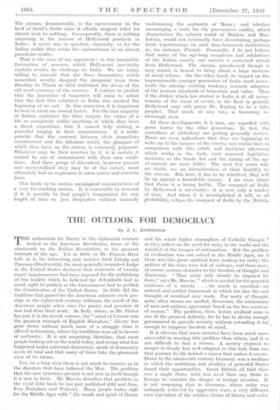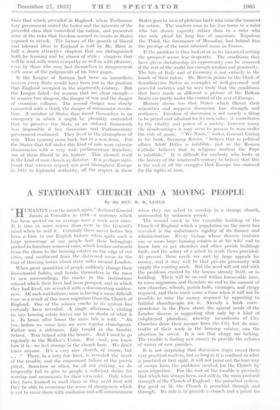THE OUTLOOK FOR DEMOCRACY
By J. L. HAMMOND HE enthusiasts for liberty in the eighteenth century looked on the American Revolution, those of the nineteenth on the Italian Revolution, as the greatest triumph of the age. Yet in 1918, as Mr. Francis Hirst tells us in his interesting and incisive book Liberty and Tyranny (Duckworth), the most generally respected Judge in the United States declared that sentences of twenty years' imprisonment had.been imposed for the publishing of two 'leaflets which he believed the defendants had as much right to publish as the Government had to publish the Constitution of the. United States. So little did the tradition that gained for the American colonists such pre- stige in the eighteenth century influence the mind of the American people when once the panics and passions of war had done their work. In Italy, where, as Mr. Fisher has put it in his recent volume, the " mind.of Cavour was the greatest triumph of English liberalism," liberty has gone down without much more of a struggle than it offered in Germany, where the traditions were all in favour -of authority. It is not surprising, therefore, that most people looking out on the world today, and seeing what has happened under universal democracy, speak of democracy as on it trial and that many of them take the gloomiest view of its future.
Yet, on a long view there is not much to surprise us in the disasters that have followed the War. The problem that the new tyrannies present is not new in itself though it is new in form. Mr. Marvin describes that problem in the vivid little book he has just published (Old and New, Ivor Nicholson and Watson). Many people today sigh for the Middle Ages with "the words and spirit of Dante and the whole higher atmosphere of Catholic thought," as thcy reflect on the need for unity in the world and the mischief of the temper of nationalism. But the problem of civilisation was not solved in the Middle Ages, for if there was this great spiritual force making for imity, the politics of the time were full of violence, and there were; of course, serious obstacles to the freedom of thought and discussion. " That unity only should be imposed by force," says Mr. Marvin, " which is needed for the peaceful existence of a society . . . So much is essential—an ordered and settled .framework in which the free life and thought of mankind may work. For unity of thought quite other means arc needed, discussion, the intercourse of men and nations, agreement based on the free exercise of reason." The problem, then, before civilised man is one of the greatest delicacy, for he has to devise enough government to provide security without extending it far, enough to suppress freedom of mind.
• It is obvious that some societies have been much more successful in meeting this problem than others, and it is not difficult to find a reason. A society exposed to danger is clearly less well adapted to this task than one that pursues its life behind a screen that makes it secure. Down to the nineteenth century Germany was a medium in which the ambitions and rivalries of powerful States found their opportunities. Great Britain all that time was a single State, with less need than any State in Europe to consider the danger of foreign invasion, it is not surprising that in Germany, where unity was unhappily achieved by aggressive wars, a very different view was taken of the relative claims of liberty and order • than that which prevailed in England, where Parliamen- tary. government suited the tastes And the interests of the powerful class that controlled the nation, and presented none of the risks that freedom seemed to create in States exposed to attack. The history of the growth of liberal and tolerant ideas in England is told by Mr. Rirst in • half a dozen attractive chapters that are distinguished both by learning and by charm of style ; chapters that will be read with warm sympathy as well as with pleasure, .even by those who may find themselves in disagreement with some of the judgements of his later pages.
. If the League of Nations had been an immediate success every State would have been put in the position that England occupied in the nineteenth century. But the League failed—for reasons that are clear enough— to remove two dangers, the danger of war and the danger of economic collapse. The second danger was closely connected with a third, the danger of communist revolu- tion. A number of States thus found themselves in an emergency in which it might be plausibly contended that to preserve the State as an ordered framework was impossible if free discussion and Parliamentary government continued. They lived in the atmosphere of war. Thus tyranny came back, but in a new form. For the States that fell under this kind of rule were extreme democracies with a very wide parliamentary franchise, one of them liberal in its history. This showed itself in the kind of man chosen as dictator. It is perhaps signi- ficant that whereas respect was paid throughout Europe in 1815 to legitimist authority, all the respect in these States goes to men of plebeian birth who seize the moment for action. The modern man in his fear turns • to a ruler who has Shown capacity rather than to a ruler who can only plead his long line of ancestors. Napoleon the Third, the forerunner of Mussolini, had behind • hirii the prestige of the most admired name in France.
If the problem is thus looked at in its historical setting the prospect seems less desperate. The conditions that have given dictatorship its opportunity can be removed if the rest of the world has enough wisdom and generosity. The fate of Italy and of Germany is not entirely in the bands of their rulers. Mr. Marvin points to the block Of 'Scandinavian States as examples of well-governed and peaceful societies and he says truly that the conditions that have made so different a picture of the Balkan States are partly under the control of the rest of Europe.
History shows too that States which illtreat their minorities and suppress discussion lose strength and resilience. Freedom of discussion is not merely a thing to be prized and admired for its own sake ; it • contributes to the vitality and power of a society, however many the disadvantages it may seem to possess to men under the rule of panic. " We Nazis," writes General Goring in his book, Germany Reborn, " belipve that in political affairs Adolf Hitler is infallible, just as the Roman Catholic believes that in religious matters the Pope is infallible." It is difficult for anybody who 'looks at the history of the nineteenth century to believe that this is the end of all the struggles that Europe has endured for the rights of man.



































 Previous page
Previous page